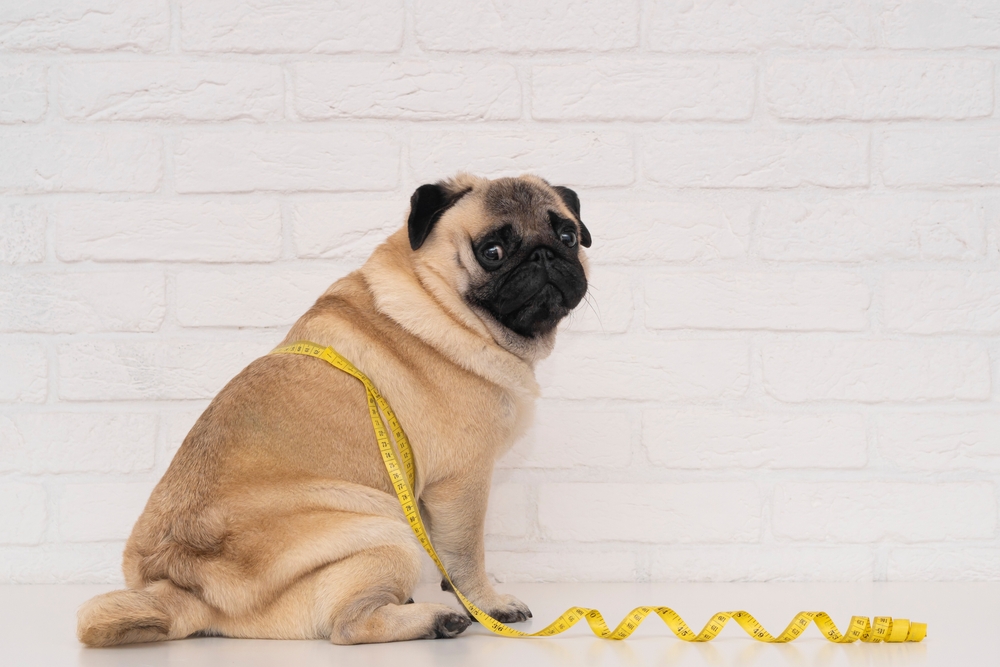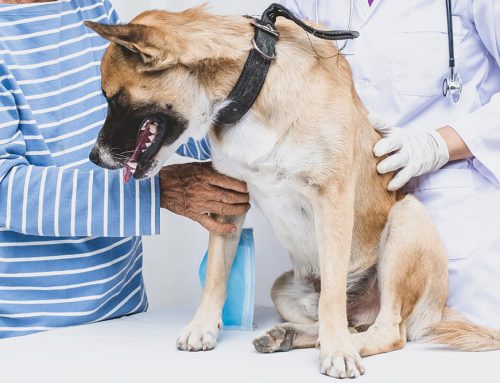A growing concern among veterinarians and pet owners alike is the issue of overweight pets and pet obesity. Just like in humans, pet obesity has become a widespread problem across the United States, leading to serious health concerns for our furry companions.
Excess weight in pets can result in a variety of health complications, such as diabetes, arthritis, and heart disease. Managing your pet’s weight is key to keeping them happy and healthy. Let’s take a closer look at how to recognize and manage pet obesity.
Recognizing Pet Obesity: How to Tell if Your Pet is Overweight
It can be difficult to determine if your pet is overweight because pets, like people, can accumulate fat in different ways depending on their breed and body type. You might not notice the extra pounds until the weight gain becomes more significant. A helpful tool for identifying this is the Body Condition Score (BCS). The BCS is a systematic way to assess your pet’s fat accumulation and muscle mass, similar to how BMI is used in humans.
The BCS ranges from 1 to 9, with 1 indicating an emaciated body condition and 9 indicating obesity. Ideally, a pet’s BCS should be around 4 or 5, which reflects a healthy and well-proportioned body. You can find descriptions of each BCS level for both dogs and cats to help you assess your pet at home. However, for a more accurate evaluation and advice, we highly recommend scheduling regular wellness exams with us at Adamson Veterinary Services.
Causes of Pet Obesity
More Than Just What’s in the Food Bowl
Pet obesity often develops when there’s an imbalance between the calories they consume and the energy they burn off. Several factors can contribute to this imbalance, including:
- Overfeeding: It’s easy to forget that treats, table scraps, and extra food are still calories that add up quickly.
- Lack of Exercise: Many pets don’t get enough physical activity, especially in urban areas where there may not be a lot of space to run around.
- Breed Predisposition: Some breeds are more prone to weight gain due to their genetics.
- Age: Older pets typically have slower metabolisms, which means they don’t burn calories as efficiently as younger pets.
- Medical Conditions: Health issues like hypothyroidism or Cushing’s disease can make it harder for pets to maintain a healthy weight.
- Spaying/Neutering: While spaying and neutering have many benefits, they can also slow down a pet’s metabolism, making it easier for them to gain weight.
Health Risks of Pet Obesity
It’s About More Than Just the Number on the Scale
Obesity isn’t just a cosmetic issue—it can significantly impact your pet’s health. Overweight pets are at a higher risk for developing several serious conditions, including:
- Diabetes Mellitus: This condition can require lifelong treatment and monitoring.
- Osteoarthritis: Extra weight puts additional strain on your pet’s joints, potentially leading to pain and mobility problems.
- Heart Disease: Carrying around excess weight often leads to higher blood pressure and heart issues.
- Respiratory Issues: Obesity can make breathing more difficult, especially when pets are active or even just resting.
- Certain Types of Cancer: Research has shown a link between obesity and certain cancers in pets.
- Skin and Coat Problems: Overweight pets may struggle with grooming, which can result in skin infections and poor coat health.
- Reduced Energy Levels and Shorter Lifespan: Carrying extra weight can lower your pet’s overall energy and significantly reduce their life expectancy.
Taking steps to manage your pet’s weight can help prevent these health problems before they become serious.
Preventing & Managing Pet Obesity

A Proactive Plan for a Healthy Weight
At Adamson Veterinary Services, we believe in taking a proactive approach to managing your pet’s weight. Here are a few ways we can help:
- Dietary Management: Feeding your pet the right kind of food in the correct portions is crucial. We can guide you in choosing the best diet for your pet’s specific needs and even recommend weight-loss diets if necessary.
- Exercise Is Essential: Regular physical activity tailored to your pet’s age and breed is key to keeping them in shape. We suggest daily walks, playtime, and interactive games to keep your pet active and mentally engaged. Even indoor cats can benefit from climbing trees or toys designed to stimulate their hunting instincts.
- Behavioral Modification: It’s important to address any human habits that lead to overfeeding or giving too many treats. Swapping unhealthy snacks for healthier alternatives and using interactive toys to slow down feeding can make a big difference in your pet’s overall health.
Helping your pet maintain a healthy weight goes beyond just diet and exercise—it’s about improving their overall quality of life. At Adamson Veterinary Services, we are here to support pet owners in Salem, Ohio, with personalized care and advice for managing your pet’s weight. If you have concerns about your pet’s weight or just want to ensure they’re staying healthy, don’t hesitate to contact us. Together, we get that weight off and keep you together for longer.







Leave A Comment